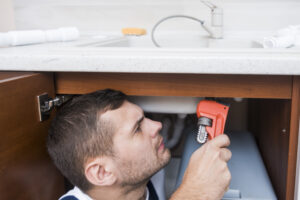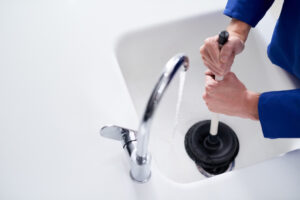6 Best Winter Plumbing Tips for Tulsa Homeowners
Winters in Tulsa can be harsh, with high winds, snow accumulation, and sub-freezing temperatures. The plumbing system underneath and around your house is exposed to these weather elements, which can cause your pipes to burst and faucets to freeze up. you need to prepare your plumbing system for winter and in this article, we will be providing you with some of the best winter plumbing tips.
To prevent plumbing damage or water leaks, you need to protect and reinforce your plumbing system.
Read Infinity Plumbing Services’ winter plumbing tips to keep your plumbing system running smoothly all winter. If you have any questions, contact Infinity Plumbing.
1. Schedule a Plumbing Inspection
Perhaps the best thing you can do to secure your system during the winter months is to schedule a plumbing inspection. A plumber can assess the parts of your plumbing most vulnerable to freezing temperatures, such as
- Pipes
- Valves
- Hoses
- Connections
- Drains
An inspection may reveal weaknesses or damaged parts in your system. The plumber can also recommend ways to protect your plumbing system so that it is reliable when you need it most. The best time to schedule an inspection is in late summer or early fall. However, regardless of how cold it is outside, it’s never too late to contact a local plumber in Tulsa, Oklahoma.
2. Insulate Your Pipes
One of the simplest ways to prepare your plumbing for winter is to insulate the pipes and valves. Insulating your hot water pipes reduces heat loss and can raise water temperature to 2°F–4°F hotter than uninsulated pipes can deliver, allowing you to lower your water temperature setting. You also won’t have to wait as long for hot water when you turn on a faucet or showerhead, which helps conserve water.
Insulation can prevent condensation from collecting on cold water pipes during the winter months of the year. Condensation can cause significant problems for a home, including water damage, mold growth, poor indoor air quality, and increased humidity. It also causes pipes to freeze faster. Something as simple as insulating your pipes can prevent condensation.
3. Cover the Outdoor Faucets
To minimize water and ice damage during winter, cover the outdoor faucets. When the season is cold, water can expand and pipes can rupture badly. When pipes burst, you have to spend money fixing the damage to walls, ceilings, and floors. There are two types of Faucet covers.
1. Hard Faucet Cover
Hard faucet covers consist of Styrofoam with a solid plastic exterior. They offer adequate protection for all kinds of outdoor faucets. The only downside to hard covers is that they are bulky. They also lack flexibility, which can make them hard to fit in tight spaces.
2. Soft Faucet Cover
Soft covers consist of soft polyester and feature thick insulation appropriate for your outdoor faucets. They also have long ties that secure the faucet cover, making them easy to install. Soft covers offer flexibility, which can be convenient if you need to install them in small spaces.
4. Schedule a Water Heater Inspection
The water heater is the sole provider of hot water during the winter. If the unit breaks down, the water supply is gone. To prevent hot water loss, schedule an annual water heater inspection, preferably before the temperature drops. An Oklahoma-certified plumber can perform a comprehensive assessment of the water heater.
What does a water heater inspection include? The plumber will
- Check the temperature and pressure relief valve
- Inspect the anode rod
- Flush the tank
- Insulate the tank
- Adjust the thermostat
A complete inspection and maintenance will keep your water heater running smoothly all winter long. Read more about water heater maintenance in detail and contact Infinity Plumbing Services your local plumbing company in Tulsa, OK, to schedule an inspection before it gets too cold outside.
5. Let the Faucet Drip in Cold Weather
Most plumbing experts recommend that you leave a faucet on with water at a drip to keep pipes from freezing. If you know where the water comes into your house, turn on a faucet at the opposite end to keep the water circulating. You don’t have to leave a stream of water running. Instead, a small drip can help prevent bursting pipes.
Keep in mind that you do not have to use hot water. The water that comes from deep in the ground is above freezing and should prevent water from freezing in the pipes. Simply use the cold water and set it so that it drips every five to ten seconds.
6. Purchase Some Heating Tape
Heat tape prevents metal and rigid plastic pipes from freezing. In sub-freezing areas, heat tape is one of the most popular ways to protect pipes from freezing because it’s affordable and works remarkably well. Heat tape isn’t sticky. It is a simple resistive heat-conducting flexible wire that uses electricity to produce heat. This heat source is held close against your vulnerable water lines and keeps the water from freezing.
Here are some things to consider when applying heating tape to pipes:
- Make sure the heating tape is appropriate for the plumbing material in your home.
- Use low-temperature heating tape for plumbing systems in older mobile homes.
- Avoid using heat tape around aluminum wiring.
- Only use heating tape when the temperature outside is below freezing.
- Follow manufacturer specifications when installing heating tape.
If you want to use heating tape but do not feel comfortable installing it, contact a certified plumber in Texas. They have the training and equipment necessary to properly install heating tape.
Schedule a Plumbing Inspection in Tulsa, Oklahoma
Winter is on the way. Is your plumbing system protected from the high winds, low temperatures, and ice storms? If not, now is the time to schedule a plumbing assessment from Infinity Plumbing Services. We offer professional plumbing inspections in Tulsa, Oklahoma. Contact us today to get an in-home assessment and estimate on plumbing repair or repiping.
Fill out our contact form or call us to schedule plumbing services in Tulsa, Oklahoma.





